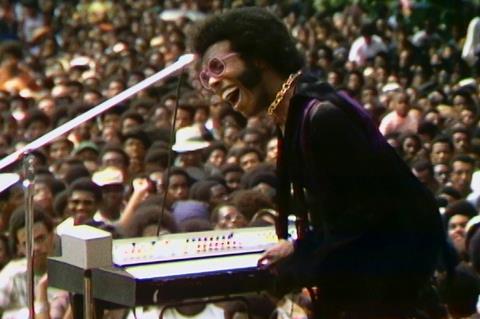‘Black Woodstock’ roars back to life

Dir: Ahmir “Questlove” Thompson. US. 2020. 117mins.
“Do you remember the Harlem Cultural Festival?” That question is asked at the start of Summer Of Soul, a joyous and thought-provoking documentary that takes us back to the summer of 1969 when a series of outdoor New York concerts celebrated the best in blues, gospel, funk and R&B. Now largely forgotten — the uncovered footage has reportedly not been seen for half a century — the shows form the foundation of director Ahmir “Questlove” Thompson’s exploration of black culture, deftly drawing connections between the impassioned music on stage and the social revolution occurring outside the festival. The performances are often revelatory, but the sense of history coming alive — of the past speaking to the present — is even more riveting.
Something that goes far beyond mere nostalgia
Thompson, best known as the drummer and creative force behind the group The Roots, will help bring visibility to the film, which was an opening night premiere at Sundance. But the real stars are the artists featured in the archival footage, including Stevie Wonder, Nina Simone, Gladys Knight & The Pips, BB King, and Sly And The Family Stone. Especially at a time when live music is on hold, Summer Of Soul will feel particularly welcome, although the serious themes interwoven into the documentary make this much more than just another concert film.
During the same summer as Woodstock, the Harlem Cultural Festival took place in Mt. Morris Park in Harlem, New York. The free shows, which were attended by more than 300,000 people, were filmed but, as Summer Of Soul’s opening titles inform us, “the footage sat in a basement for 50 years.” Featuring interviews with attendees, cultural commentators and a few of the musicians who played the festival, the documentary means to be a history lesson as well as a highlight reel of memorable sets.
Early on in Summer Of Soul, one of Thompson’s interview subjects recalls being at the Harlem Cultural Festival and marvelling at the fact that the crowd was “a sea of black people.” Not surprisingly, then, one of the film’s central takeaways is that what made these concerts so resonant for both the artists and the audience is that they became a way for all involved to process the racial tensions they endured in America — while also celebrating their heritage and cultural identity. (In subsequent years, the shows were nicknamed Black Woodstock to symbolise their importance to the community.)
Consequently, Summer Of Soul proves to be more emotional than the typical music documentary. The process of retrieving this footage and gathering those who were there becomes an act of remembrance that, as Thompson’s speakers explain, is emblematic of the problems black Americans face when their history is erased or minimised. Whether it’s random concertgoers or members of the pop group The 5th Dimension, watching clips from the Harlem Cultural Festival for the first time in decades has a profound impact on the interview subjects — something that goes far beyond mere nostalgia.
The footage both looks and sounds superb, and there are immense pleasures in seeing, for instance, a lanky, 19 year-old Stevie Wonder — his great artistic flowering still ahead of him — ebulliently singing “Shoo-Be-Doo-Be-Doo-Da-Day.” But the highs of the performances are smartly complemented by Summer Of Soul’s examination of the era’s political climate, in which civil-rights leaders Malcolm X and Martin Luther King Jr. had been killed and the fight for racial equality was being intensely waged. Without straining, Thompson adroitly connects the pain and defiance in some of the performances to the struggles black Americans were experiencing, which makes sets by Nina Simone and Pops Staples And The Staple Singers feel even more anguished and soulful because of the underlying subtext.
Of course, what goes unspoken in Summer Of Soul is that the battles of the 1960s continue on, a realisation that makes these old songs of protest and black power still feel timely. Not every performance is a winner — some of the acts haven’t stood the test of time — but the festival’s rousing spirit is so seductive that even the weaker sets ripple with energy. Thompson’s subjects speak about the Harlem Cultural Festival as if it were a dream. Summer Of Soul brings that dream vibrantly back to life.
Production company: Vulcan Productions Inc.
International sales: Cinetic, john@cineticmedia.com
Producers: Joseph Patel, Robert Fyvolent, David Dinerstein
Editing: Joshua L. Pearson
Cinematography: Shawn Peters
























